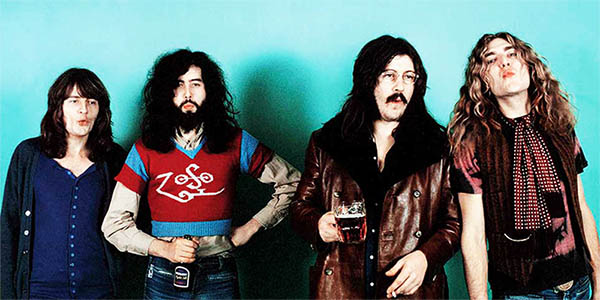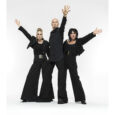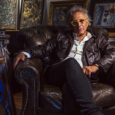LED ZEPPELIN – DAY BY DAY
AN INTERVIEW WITH MARC ROBERTY – AUTHOR OF LED ZEPPELIN “DAY BY DAY”
Led Zeppelin – who hasn’t heard of them, one of the legendary giants of the Hard Rock genre? Many stories, myths and legends have been told of the band’s history.Probably one of the most featured bands and most written about bands ever!
I opened our conversation by asking Marc what set his book apart from all the other books on the same subject. Marc responded, “good question. Basically I was inspired, in a way, by the reissue campaign. Of course that finally revealed. . . well actually it revealed two things, really. One that there wasn’t that much left in the vaults in terms of studio material. It did still reveal some interesting dates, facts and information. I thought with that in mind it could form an interesting basis for a book covering what they did in their 12-year period.For me, I also wanted the book to be for people getting into them for the first time and who didn’t have any of the other books. Nonetheless, I wanted to do something that even for the hardcore fans (has) some new information. I was able to get some information that hasn’t been published before and also correct some incorrect information as well. Those main three points were actually the idea behind writing the book.”
As an introduction to the subject of the book I asked Marc what his own personal introduction to Led Zeppelin was. Can he recall or recollect his first Led Zeppelin memory? Marc replied, “I do actually, and that is another very interesting point. I suppose with any band people have very strong opinions. I guess that it probably dates to when someone first got into the band. For me I actually got into the band from day one. I happened to be living in South Africa from when I was 13. I remember walking past a record store and I saw this window display for the first Led Zeppelin album. I had never heard of them because there were no music magazines in South Africa. I really had no way of realising who Led Zeppelin were. I was really attracted to the cover – it was really eye-catching. I thought that any band that can produce such great artwork is usually going to be good.” He chuckled before adding, “I basically begged my old man to buy it for me – which he did. I got home, put it on, and was basically blown away,but that is from a 13-year-old’s perspective. Up until that point I had been into Cream and Hendrix. Zeppelin really sounded very different to Hendrix and Cream; I think that was the appeal to me as I really hadnt heard anything like that before. You couldnt really pigeon-hole them into Blues Rock or anything – it was more than that. To me it was a real eye-opener, and I have followed them ever since.” The book consists of a mountain of factual information as, despite their short lifespan(12 years only), the band was incredibly industrious in terms of both recording and touring. I asked Marc if the researching process for writing the book was as difficult as it seems. Marc paused before stating, “in the past I have been known for my Eric Clapton books, and that was another reason (I wrote this book); I was fed up being a kind of a one-trick pony and keep writing about Clapton. There are many other people that I enjoy as much as Eric Clapton. That was another reason to do the book, as I was a huge fan of Zeppelin’s music from day one, really. When I was doing research for my last Clapton book I spent a lot of time down at the British Archives Library.

At the same time that I was doing research for the Clapton book I was also doing research for the Led Zeppelin book; I was doing two things at once. In terms of the live shows I have a pretty extensive bootleg collection. Led Zeppelin live is a very different animal to Led Zeppelin in the studio. They are not like 10cc, where if you see them live pretty much what you hear is almost an exact replica of what they did in the studio. They would dramatically change things on stage, would extend numbers. . . and so forth. I also used as a reference Dave Lewis (Time Magazine); he is a friend of mine ,and does some great work. I used his book as a reference, and one or two websites. I would say in terms of opinions of concerts throughout the years, I was probaly in terms of 80 per cent in agreement with other people’s points of view, (but) not with everything, to be honest with you. I mean I really found that frankly from after 75 from a creative point of view that they really went downhill. That is really when my opinion starts to change from other people’s. It did take about two years, I suppose, which is not really that long.” Marc’s work role cv is quite varied; music journalist is listed on there. I asked him how he diversified into actually writing books about favourite music artists. Was it that it presented a new career challenge? Or was it simply a case (as I myself have found) that it does not pay the bills? Marc replied, “probably both, to be honest. For most of my working life I was in corporate travel. When I was made redundant, I decided to make what was essentially a hobby into a livelihood. That is really how it happened. I was very lucky that I got my first book published in 1983. Once you have something published, people tend to open doors. It’s just really getting your foot in the door; once you have got your foot in the door. . . I am not necessarily saying it is easy. It is certainly easier than if you have got nothing behind you. Also, I knew quite a few people in the music publishing world, which helped. It’s only really since I got made redundant that I have gone into it full time.” Are writers born, I mused. . . I asked Marc if he was naturally gifted at English since his school days, or was it an interest he had formed at a later time of his life? Marc responded, “I still dont think that I am a particularly good writer. “Given that his writing has appeared in such esteemed publications as “Guitarist,” “Rolling Stone” and “Financial Times,” I felt he was being modest. Marc continued, “my forte is more in the research,and finding stuff that people possibly have not known before. That is really what I enjoy doing. I have done a lot of research of music, films. I try and find old footage or old studio material that to all intents and purposes has disappeared. I try and track things down. That is probably my forte: really to try and get to the bottom of things. Follow the story through to its ending. Sometimes the search carries on. That I do find enjoyable.” The majority of Marc’s books are about musicians; is music still an enduring passion? Does he still enjoy attending live concerts? Surprisingly, Marc replied, “not anymore, and to be perfectly honest with you I feel that I have seen all the great bands when they were at their peak. For me I certainly wouldnt go and see The Who today, or even the Stones for that matter; I like the bands obviously and I have still got all their albums. I am just an old fogey now (laughs). I don’t really go to see that many. If I do go, it’s probably a band that I would see in a club. The days of going to the big arenas and festivals are over for me.”

I wondered what was Marc’s next writing project; did he have anything in the pipeline? Indeed, had he already embarked on his next literary challenge?
Marc filled me in with, “Yeah, I have got a few things that I am working on. One of them is a Jeff Beck “Day by Day.” I mean, I love Jeff Beck. He is still really, out of the three Surrey guitarists (Page,Clapton and obviously Beck), the one that is still breaking new boundaries, I think.That is at the age of 70. He is a guy that when he is touring I do go out and see him. He always blows me away – always. There is not that much about him that has been done. He has just recently done a book with Genesis publications but that is more of a photographic book of his life rather than concerts and recordings.”
Writing books on many of his favourite musical heroes – did researching those involve actually the opportunity to sit down and chat face-face with those musical icons? Marc said, “Yeah that is one thing that what I do now has allowed me to do, and I have pretty much met all my musical heroes. That for me has been an amazing opportunity.”
Writers all have their own individual process in creating. I discussed with Marc which worked personally the best for him. Did he have a particular time of day he preferred to work and write, or did he just work when the muse strikes?
Marc said, “Yeah, pretty much. If what I am writing is pure gibberish, I tend to write in a narrative style, which I enjoy. If that is not happening, then I basically stick all the research down on a bit of paper. Then maybe later on I will just put in the text around the research. That works quite well. As a career and process, writing for a living – like everything else – has its good and bad points.”
Marc stated that being in the right frame of mind, which you couldnt be 24/7, was difficult but when you got there it was, “just so enjoyable. Finding a new piece of information was also quite inspiring.”
I wondered if Marc had considered writing in a different subject area outside of what he had previously done. “I have actually done something quite different a couple of years ago; I helped Bobby Whitlock, who had formed Derek and the Dominoes with Eric Clapton, to write his autobiography, and that was really fun.” In the modern era of social media and Internet technology, that would open new possibilities for writers in terms of marketing. I asked Marc which was his preferred methods of use. Did he use a combination of methods? “Pretty much, these days. I mean social media is a big help.The publisher in this case has got a blog page.I contribute to various blogs and articles and they distribute worldwide. I have arranged a few marketing opportunities myself. Otherwise the publisher arranges interviews for me and I just do them, really.”
I have enjoyed reading the Led Zeppelin “Day by Day” book. It is not a book to read in a straight session; rather, it is one that serves up its qualities gradually. Equally useful as a narrative and also as a point of historical reference. I was surprised initially that its author had released a book to add to the saturated market on this particular band. However, where this book sets itself apart from the others is in its ability to dig up new information on a band where it had seemed the archives were already exhausted. For this reason alone I would deem it a necessary purchase for both Led Zeppelin obsessives and also enthusiastic newcomers to the band.
ABOUT THE AUTHOR
Marc Roberty is an award-nominated author, music journalist, and music historian. His articles have been featured in Guitaristmagazine, Rolling Stone, Best (France), Mojo, The Financial Times, The Independent, and Where’s Eric (Official Eric Clapton fan magazine). He has also done film and audio research for the forthcoming Eric Clapton anthology film. He has written several books covering Clapton’s musical life and co-authored Bobby Whitlock’s autobiography.











